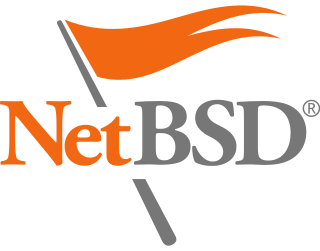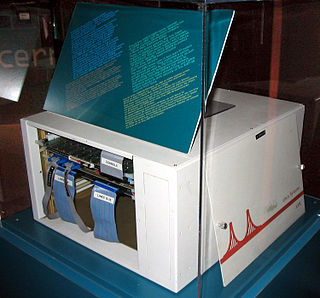A monolithic kernel is an operating system architecture where the entire operating system is working in kernel space. The monolithic model differs from other operating system architectures in that it alone defines a high-level virtual interface over computer hardware. A set of primitives or system calls implement all operating system services such as process management, concurrency, and memory management. Device drivers can be added to the kernel as modules.
Operating system advocacy is the practice of attempting to increase the awareness and improve the perception of a computer operating system. The motivation behind this may be to increase the number of users of a system, to assert the superiority of one choice over another or out of brand loyalty, pride in an operating system's abilities, or, with open source operating systems, political or philosophical reasons, or to persuade software vendors to port specific applications or device drivers to the platform.
In computing, traceroute and tracert are computer network diagnostic commands for displaying the route (path) and measuring transit delays of packets across an Internet Protocol (IP) network. The history of the route is recorded as the round-trip times of the packets received from each successive host in the route (path); the sum of the mean times in each hop is a measure of the total time spent to establish the connection. Traceroute proceeds unless all (three) sent packets are lost more than twice; then the connection is lost and the route cannot be evaluated. Ping, on the other hand, only computes the final round-trip times from the destination point.
A computing platform or digital platform is the environment in which a piece of software is executed. It may be the hardware or the operating system (OS), even a web browser and associated application programming interfaces, or other underlying software, as long as the program code is executed with it. Computing platforms have different abstraction levels, including a computer architecture, an OS, or runtime libraries. A computing platform is the stage on which computer programs can run.
PF is a BSD licensed stateful packet filter, a central piece of software for firewalling. It is comparable to netfilter (iptables), ipfw, and ipfilter.

XNU is the computer operating system kernel developed at Apple Inc. since December 1996 for use in the macOS operating system and released as free and open-source software as part of the Darwin operating system. It is also used as the kernel for the Apple TV Software, iOS, watchOS, tvOS, and audioOS operating systems. XNU is an abbreviation of X is Not Unix.

pkgsrc is a package management system for Unix-like operating systems. It was forked from the FreeBSD ports collection in 1997 as the primary package management system for NetBSD. Since then it has evolved independently: in 1999, support for Solaris was added, followed by support for other operating systems.
These tables provide a comparison of operating systems, of computer devices, as listing general and technical information for a number of widely used and currently available PC or handheld operating systems. The article "Usage share of operating systems" provides a broader, and more general, comparison of operating systems that includes servers, mainframes and supercomputers.
BSD/OS is a discontinued proprietary version of the BSD operating system developed by Berkeley Software Design, Inc. (BSDi).

TrueOS is a Unix-like, server-oriented operating system built upon the most recent releases of FreeBSD-CURRENT. It aims to be easy to install by using a graphical installation program, and easy and ready-to-use immediately by providing KDE SC, Lumina, LXDE, MATE, or Xfce as the desktop environment. It provides official binary Nvidia and Intel drivers for hardware acceleration and an optional 3D desktop interface through KWin, and Wine is ready-to-use for running Microsoft Windows software. TrueOS is able to run Linux software, in addition to FreeBSD Ports collection, and it has its own .txz package manager. TrueOS supports OpenZFS, and the installer offers disk encryption with geli.
There are a number of Unix-like operating systems based on or descended from the Berkeley Software Distribution (BSD) series of Unix variant options. The three most notable descendants in current use are FreeBSD, OpenBSD, and NetBSD, which are all derived from 386BSD and 4.4BSD-Lite, by various routes. Both NetBSD and FreeBSD started life in 1993, initially derived from 386BSD, but in 1994 migrating to a 4.4BSD-Lite code base. OpenBSD was forked from NetBSD in 1995. Other notable derivatives include DragonFly BSD, which was forked from FreeBSD 4.8, and Apple Inc.'s iOS and macOS, with its Darwin base including a large amount of code derived from FreeBSD.
The Berkeley Software Distribution (BSD) was an operating system based on Research Unix, developed and distributed by the Computer Systems Research Group (CSRG) at the University of California, Berkeley. Today, "BSD" often refers to its descendants, such as FreeBSD, OpenBSD, NetBSD, or DragonFly BSD.

Junos OS is the FreeBSD-based operating system used in Juniper Networks hardware routers. It is an operating system that is used in Juniper's routing, switching and security devices. Juniper offers a Software Development Kit (SDK) to partners and customers to allow additional customization. The biggest competitor of Junos is Cisco Systems' IOS.
In computing, route is a command used to view and manipulate the IP routing table in Unix-like and Microsoft Windows operating systems and also in ReactOS. Manual manipulation of the routing table is characteristic of static routing.

NetBSD is a free and open-source Unix-like operating system based on the Berkeley Software Distribution (BSD). It was the first open-source BSD descendant officially released after 386BSD was forked. It continues to be actively developed and is available for many platforms, including servers, desktops, handheld devices, and embedded systems.
Michael J. (Mike) Karels is an American Software Engineer and one of the key people in history of BSD UNIX.
The History of the Berkeley Software Distribution begins in the 1970s.








